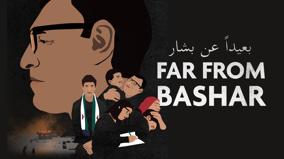This is Not a Movie
For more than 40 years, journalist Robert Fisk has reported on some of the most violent and divisive conflicts in the world. Yung Chang’s This Is Not a Movie captures Fisk in action—feet on the ground, notebook in hand, as he travels into landscapes devastated by war, ferreting out the facts and firing reports back home to reach an audience of millions. The process of translating raw experience into incisive and passionate dispatches requires the determination to see things first-hand and the tenacity to say what others won’t. In his relentless pursuit of the facts, Fisk has attracted his share …

Details
Yung Chang’s This Is Not a Movie captures Fisk in action—feet on the ground, notebook in hand, as he travels into landscapes devastated by war, ferreting out the facts and firing reports back home to reach an audience of millions. The process of translating raw experience into incisive and passionate dispatches requires the determination to see things first-hand and the tenacity to say what others won’t. In his relentless pursuit of the facts, Fisk has attracted his share of controversy. But in spite of the danger, he has continued to cover stories as they unfold, talking directly to the people involved. In an era of fake news, when journalists are dubbed “the enemies of the people,” Fisk’s resolve to document reality has become an obsessive war to speak the truth.
-
writerYung Chang
-
directorYung Chang
-
co-writerNelofer Pazira
-
producerAnita LeeAllyson LuchakNelofer PaziraIngmar Trost
-
editorMike Munn
-
cinematographyDuraid Munajim
-
original musicOhad BenchetritJustin Small
-
title sequenceHandt & Wolber
-
graphicsHandt & Wolber
-
executive producerAnita LeeChristopher ClementsJulie Goldman
-
associate producerKate VollumJohn Griffith
-
participantRobert FiskYaraGeneral Jihad SultanAntranik HelvadjianTim EddySuheil NatourNirmeen HazinehTsoleen SarianLt. Finian EverardVesna AlmogIfet KrnjicAdis IkanovicAmira SolhAmer MrayatiLamiaa Al SaadAmira HassAntony LoewensteinChaim SilbersteinSulieman Khatib
-
business affairsColette Johnson-Vosberg
-
production managerAndje BorojevicBettina Müller
-
sound recordistJason PorterDaniel HewettRami Al Dulli
-
assistant cameraPeter HowieAli Al-Daradji
-
fixerSaseen KawzallyEmmanuel HaddadVesna AlmogYaraQuique Kierszenbaum
-
driverNoor SaadMohammedGoran KrunicZoran KrunicMohammadRawan IdkaidkSamir Al-Sharif
-
assistant editor traineePhillip Hawkes
-
visual researcherTanya Fleet
-
archival researchLucas DowlingNelofer Pazira
-
fact checkingLucas DowlingNelofer Pazira
-
researcherJackie CorkeryJonah Engle
-
translationAll Languages LtdTextimbild
-
transcriptionLaurel ToewsHouse of Transcription
-
executive director of programmingMichelle van Beusekom
-
manager, studio operationsMark Wilson
-
production supervisorMarcus Matyas
-
production coordinatorAndrew Martin-Smith
-
technical coordinatorKevin Riley
-
studio coordinatorCarly Kastner
-
legal councilChristian Pitchen
-
marketing managerMelissa Wheeler
-
post-production supervisorErhard Giesen
-
video post-productionFarbkult Post Production
-
conformFabian Eisenacher
-
colouristFelix Hüsken
-
audio post productionTorus Filmtonpostproduktion
-
audio post production supervisorStephan Colli
-
dialogue editorMatthias Lempert
-
re-recording mixerMatthias Lempert
-
sound designMirko Reinhard
-
assistant sound designErik Reck
-
ADR recordistSebastian StrouxTom Protzer
-
technicianMarkus Emonds
-
scheduling torusBettina NesselrathHildegard Nonnemacher
-
subtitlesTextimbild
-
production tax credit advisorJimmy YeKudlow Ye Professional Corporation
-
production accountantFuller Landau LLPLaura Couvrette
-
production bookkeeperMarcella Vetere
-
accountantBernhard Rand
-
legal counselReisman Law OfficesHatty ReismanJennifer Dick
-
title searchThe Rights CompanyShannon Hancock
-
assistant business affairsBetty Ann Tutching
-
production insuranceFront Row Insurance Brokers Inc.Darlene MilleyReel Media CanadaSteve Fraser
-
commissioning editorMartin PieperSusanne MertensBarbara TruyenSteven ArtelsGaspard Lamunière
Education
Pedagogical evaluations and study guides are only available to CAMPUS subscribers.
CAMPUS
Features designed specifically for teachers. Learn more
Already subscribed? Sign in











